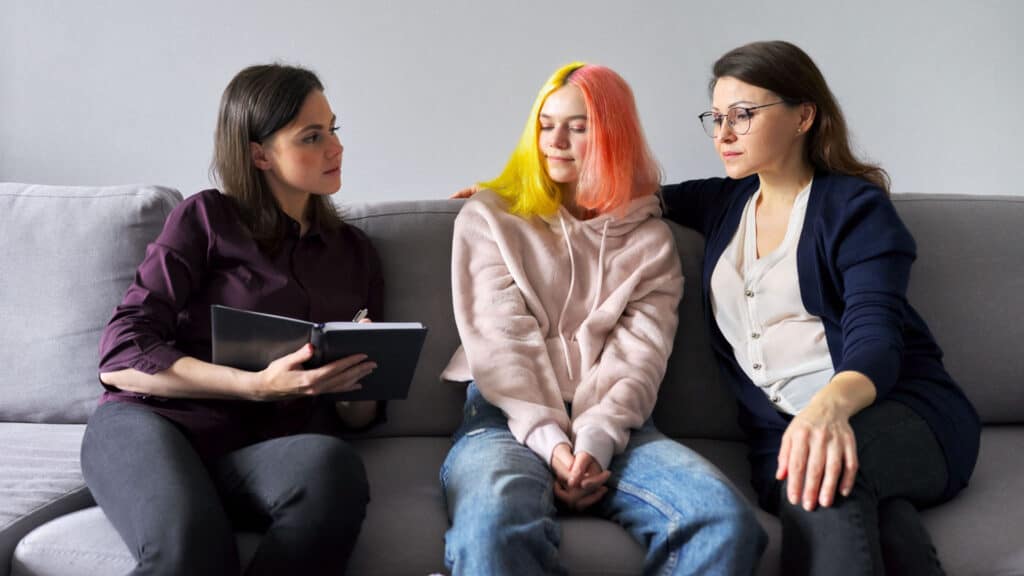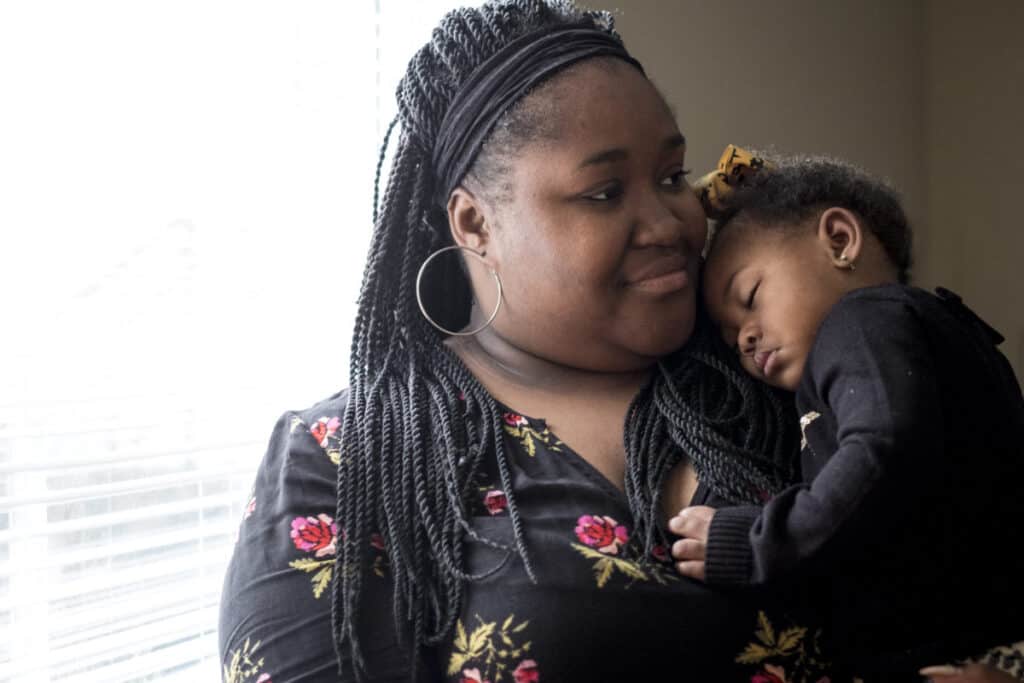When your child graduates or turns 22, they age out of special education. The school system will stop providing services, and their IEP will no longer be active. But at this point, there are social service agencies for adults with disabilities that can help. If your child qualifies, these agencies can offer lifelong support.
During transition planning, your IEP team should put you in touch with the appropriate agencies, and many of them can start to support your child’s needs as they finish high school. You will need to give the school permission to refer you. Don’t be scared to do this! The agencies can give lots of support and it’s all your choice. You can also call them yourself at any time.
Adult service agencies offer things like job training and support, help learning independent skills, housing support, or personal care services. Some are specifically for adults who are Deaf or hard of hearing, blind or visually impaired, or have mental health needs.
Your IEP team will help you decide which ones are the best fit, and their supports may be written into your Transition Plan.
Different kinds of social service agencies for adults with disabilities:
The go-to department in each state that provides support for people with developmental disabilities. They offer a wide variety of programs and supports.
Vocational Rehabilitation (VR) Agencies
The department in each state that helps people with disabilities meet their job goals. They offer training programs, job matching, and support on the job.
Centers for Independent Living (CILs)
These centers provide support to adults who need help living independently. They can help people find a place to live and coordinate the services they need.
A nationwide network of programs to support people with developmental disabilities and their families. Arc services vary by state and local office, but one of their main goals is to advocate for public policies to protect disability rights. Many chapters also offer services for education, job preparation, transition to adulthood, and housing.
There are also state agencies that support residents who:
We know it can be hard to have your child leave the structure and support that high school offers. But with good planning, your adult child can get many benefits from these agencies that offer a variety of social services for adults with disabilities.
Learn more:
- Connecting with support organizations and other parents
- Self advocacy for teens
- Transition success stories from The PACER Center
************************************
LA:
Here are some of the disability support agencies in Louisiana:
Louisiana Rehabilitation Services (LRS)
This is a state agency that helps people with disabilities reach their job goals. They provide career counseling, job training, job placement, and support on the job. You can call and apply when your child is 16, and they can start providing services during high school.
There is sometimes a waiting list, so connect with them as soon as possible!
When do I apply to LRS?
- The end of junior year in high school
- You can apply anytime after that, but it’s better not to wait. There may be a waitlist
How do I apply?
- Ask your guidance counselor or IEP team. Give the team permission to connect you
- Or find your local LRS office and call them directly. They will tell you how to apply
What to expect:
- LRS will assign a vocational rehabilitation (VR) counselor to work with your child
- You will all meet to talk about your child’s needs and abilities
- They will do an evaluation to see if your child qualifies and what services they might need
- Together, you will decide on services and make a plan to help your child prepare for getting a job
- They may have a waitlist! It will depend on your child’s needs and the state budget
What kinds of services do they offer?
- Medical exams (physical, psychological, or others)
- Evaluation of interests, skills, and abilities for future work
- Career Counseling
- Mental health counseling, speech therapy, physical therapy, etc.
- Training through special programs, apprenticeships, on-the-job training, etc.
- Equipment or devices that your child needs in order to work (wheelchairs, prostheses, glasses, communication devices, etc.)
- Help with adaptations (changes) at the job site (changing lighting, adapting a telephone, a computer, or a tool, etc.)
- Job Placement
- Follow up after employment to ensure job success
Contact LRS: Find your Regional LRS office, or call the main office: (225) 219-2225
To find other Vocational Rehabilitation programs, use our Resource Directory (en español):
- Put in your zip code and choose Transition Services or Vocational Programs in the Education & Employment section
The Office for Citizens with Developmental Disabilities (OCDD)
This is Louisiana’s state agency to support children and adults with developmental disabilities. They offer a variety of services and can also take applications for Medicaid Waivers, which can provide important services during your child’s life.
OCDD programs are run through your local Human Service District (HSD) or Human Services Authority (HSA).
To learn about and apply for services from OCDD:
- Call your local HSD/A office
- Tell them about your child’s disability and what kind of services they need in order to live a full life. Be specific and thorough
- Ask them about Medicaid Waivers and what other services your child might qualify for
The Arcs
The Arcs are a nationwide network of programs for people with disabilities. For students transitioning out of school and into adulthood, they offer:
- Help transitioning to adult life
- Job training and placement
- Help with education and other services
Contact The Arc of Louisiana or your local chapter. You can find your local chapter, listed by region, in the “About Us” section at the top of the Arc homepage.
Centers for Independent Living (CILs)
These centers provide support to adults who need help living independently. They can help people find a place to live and coordinate the services they need.
Find your local Center for Independent Living.
MA:
The Department of Developmental Services (DDS)
DDS offers services to children and adults with developmental disabilities.
- There are many different supports and services. They can help with finding a place to live, getting training or in-home support, connecting with community activities, and much more
- There is a process of applying. Once you have applied and your child is registered, you can get the services as long as they still qualify. Once they turn 22, they will have to re-apply for adult services
- To learn more, see this Overview of DDS Services
Who qualifies for DDS services?
A person has to be a Massachusetts resident and have a documented Developmental Disability.
Here is the DDS definition of developmental disability: For persons who are five years of age or older, a severe, chronic disability that:
- is attributable to a mental or physical impairment resulting from Intellectual Disability, Autism Spectrum Disorder, Smith-Magenis Syndrome, or Prader-Willi Syndrome
- is manifested before the individual attains 22 years of age
- is likely to continue indefinitely
- results in substantial functional limitations
How to apply to DDS
There are 4 regions of DDS in Massachusetts. Each one has a Regional Eligibility Team, who will be in charge of your application.
To apply for DDS services, call your nearest DDS Office. You’ll get a call from a Regional Eligibility Team member, who will schedule a meeting to go over your application.
They will make a decision within 60 days to see if your child qualifies and assign a coordinator to help you with your services.
If your child is blind, they will work with the Massachusetts Commission for the Blind instead of DDS. They offer the same types of services.
The Massachusetts Department of Mental Health (DMH)
The Mass DMH offers support for the mental health needs of Mass residents. Learn more about their supports for transition-age youth.
The Massachusetts Rehabilitation Commission (MRC)
MRC is the state agency that helps people with disabilities to live and work in their communities. Your child may work with MRC in high school as part of their transition plan.
The MRC includes these programs:
- Transition Services for Students and Youth
- Vocational Rehabilitation Program (VR)
- Community Living Division (CL)
- Disability Determination Services (DDS)
- Turning 22 Program
To apply for any of them or learn more, call the main office at: (800) 245-6543, or your local office.
Explain your disability and ask for a consultation. They will meet with you and learn about your goals and needs for support. Then they will help you apply to the programs that fit your needs.
1. Transition Services for Students and Youth
MRC has a variety of programs for students with many levels of disability to help them gain leadership skills and prepare for adult living and working.
Here are some examples: Leadership training
- Peer counseling and mentoring
- Life skills training
- Pre-Employment services like job counseling, job readiness training, and structured internships
Read more from Mass.gov: Transition Services for Students and Youth
Brochure for students: Creating your Independent Future / Creación de su Independiente Futuro
2. Vocational Rehabilitation Program (VR)
This program helps people with disabilities to find and keep a job. They work with high school students and people who are out of school.
To qualify for these services, you must:
- Have a physical or mental disability that makes it hard for you to work
- Want to work
- Need support to train for, keep, or find a job
Examples of services:
- Assessments of skills and interests
- Training
- Help with job placement
- Supported work, job coaches, tutors
- Pre-Employment Training Services (Pre-ETS) for students aged 14-22
- Assistive technology or vehicle adaptations
- There are many more!
Learn more from Mass.gov: What is Vocational Rehabilitation?
3. Community Living Division (CL)
This division of MRC helps people with developmental disabilities, head injuries, or traumatic histories to live in the community as independently as possible.
There are several different programs that provide this help in different ways.
Adult Supported Living: A case coordinator will work with you to find out what support you need to live independently. This may include help to manage your household, finances, transportation, or recreational activities
Home Care Assistance: A person who comes to your home to help with basic needs like cooking, shopping, laundry, picking up medicine, etc.
Assistive Technology: Help with devices and equipment that let you communicate, move around, and do the tasks of daily life
Protective Services: They follow up if you suspect someone of abusing a person with a disability
There are more!
4. Disability Determination Services (DDS)
This program helps people to apply for government benefits from the Social Security Administration (SSA).
These include SSI (Supplemental Security Income) and SSDI (Social Security Disability Insurance).
Note: This last service is sometimes called DDS. Don’t confuse this with the more common use of DDS as the Department of Developmental Services!
Read more on Mass.gov: Disability Determination Services.
5. Turning 22 Program
This is for teens and young adults who have mobility impairments.
There are 3 Parts:
- Supported Living: A case coordinator will work with your adult child in their home to help them manage daily activities, then when they leave school, help them find a place to live and in-home support
- Transition to Adulthood Program (TAP): Your child will connect with a peer counselor and get training to build their independent living skills
- Ancillary Supports: Money is sometimes available to help buy adaptive equipment like specialized computers, communication devices, or home modifications
To learn more:
- Call (800) 223-2559
- See the MRC Turning 22 Program web page
- See this 2-page brochure: Turning 22 Independent Living Program
************************************



